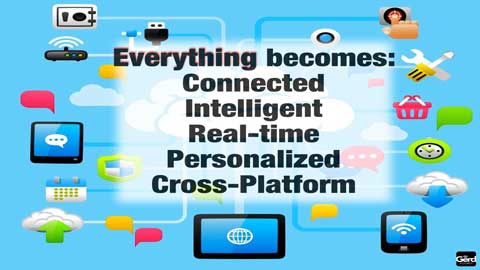BUILDING DIGITAL FARMS FOR THE FUTURE
It is universally acknowledged that agriculture is vital for a country's development as well as people's standard of living. The cultivated farmland has been decreased in the past few years, while the population has been increasing day by day. How to produce more plants by using less resources would become a big problem for today's people.
Fortunately, someone came up with a good idea. The MIT's open agriculture initiative is promoting the digital farms building, which will help us produce more and more healthy and nutritional plants in a more modern way.
At first, let me illustrate some understandings about " What's digital farms?" It's a place in which plants could grow well without soil by the use of hydroponics. And the techniques could help you to produce plants in a totally controlled environment. For example, you can check everything from content to temperature, even the light exposure can be regulated. And you can always make those plants look, taste and grow exactly the way you want them to be.
What are the benefits of digital farms? In fact, there are lots of big advantages.
First, it's very good at saving time. By using these methods, you could make the plants grow three to five times faster than traditional farming, which would help you save a lot of time and improve the productivity. Also, you might do something like harvesting within twenty minutes.
Second, it's very water-saving, you just need to use 70% to 90% percent less water than traditional farming to produce the same plants. I think it would be especially meaningful for those deserted places in the northwest of China. People there could produce cabbages and some other vegetables in the local area instead of purchasing them from other places.
Third, it's much more convenient than traditional farming. It's much easier for carrying.So you can place those digital farming machines closer to cities, and you can even put them in the supermarket.
Fourth, you can save a lot of space by adapting digital farms. If the plants were harvested, you could plant the same or different plants at the same place again and again for a year around.
Fifth, the plants grown in the digital places would be higher-qualified because they were developed under a stringent control. By using the traditional way to produce plants, there would always have a problem that the plants are very different ,some bigger, some smaller, some look good and beautiful, some look bad and ugly, some taste delicious, some taste awful. But this problem would be perfectly solved in digital farms because some plants would be produced as good as others.
Last but not least, consumers would feel safe and satisfied because they could monitor the growth process of the plant they are going to buy and get some more reliable information from the suppliers. At present, many people are afraid of purchasing and eating up vegetables or fruits produced by other people. What if those suppliers use poisonous chemical materials to make more profit? They insert some chemicals which would be bad for people's health to the products to make them much fresher or lightly. I really hate this. But with the development of digital farming, the condition would be changed.
At last, I really want to say that I'm glad with the development of the digital farms. I know there are many people who against plants produced in digital farms because they think it's not a very natural way to cultivate plants like that and it may do harm to our body. We do have to pay more attention at the road of science revolution, but we also have to show more courage to try, to challenge and to develop.

